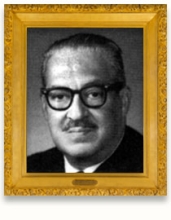Solicitor General: Thurgood Marshall

Thoroughgood ("Thurgood") Marshall was born in Baltimore, Maryland, on July 2, 1908, the younger of two sons of William and Norma Marshall. His father William was a railroad porter and later steward at a whites only country club. His mother Norma was a public school teacher for over 25 years.
After high school, Marshall attended Lincoln University in Oxford, Pennsylvania. He graduated in 1930. He and his wife Vivien (Buster) Marshall discussed his future plans, and they decided he would attend law school. Marshall applied to the University of Maryland Law School, but was denied admission due to racial segregation. Marshal then attended Howard University Law School. Marshall's mother Norma pawned her wedding and engagement rings to pay his tuition.
At Howard, Marshall was mentored by Vice Dean Charles Hamilton Houston, a distinguished graduate of the Harvard Law School. Marshall graduated from Howard in 1933. He opened a law office in Baltimore that year, and the next year represented the Baltimore chapter of the NAACP. Marshall arranged for Donald Murray to apply to the University of Maryland Law School. When Murray's application was denied, Marshall sued on Murray's behalf. Marshall's mentor and former teacher, Houston, tried the case, with Marshall's assistance. They won the case.
In October 1936, Marshall joined the national staff of the NAACP. Marshall remained counsel to the NAACP for 25 years. Houston, Marshall and the NAACP crafted a strategy of attacking Jim Crow by focusing on what was mandated by Plessy v. Ferguson (1896), "separate but equal," rather than by attacking the doctrine laid out by Plessy. After establishing the inequality faced by Negroes in American, the NAACP began to attack the Plessy doctrine in 1945. The culmination of this effort was Brown v. Board of Education (1954), which Marshall argued to the Supreme Court. The decision in Brown overruled Plessy in the field of education, but said nothing about other aspects of segregation.
In 1961, Marshall was nominated to the United States Court of Appeals for the Second Circuit by President John F. Kennedy. He remained on that court for four years. In 1965, President Lyndon Johnson convinced Marshall to leave the Court to become Solicitor General. Marshall remained Solicitor General until 1967. When Tom Clark resigned from the Supreme Court to avoid a conflict of interest with his son as the Attorney General, this created an opening in the Court. President Johnson nominated Marshall, the first African American to sit on the Court.
Thurgood Marshall was a member of the Supreme Court until retiring in 1991, serving on the Court for 25 Terms. He began when the Warren Court was at its peak, and gradually his opinions were more often dissenting than majority opinions. He was a vociferous proponent for claims of equality. He was categorically opposed to the death penalty and favored claims of noneconomic substantive due process.
Marshall married to Vivien (Buster) Burey in 1929. She died of lung cancer on February 11, 1955. He married Cecilia (Cissy) Suyat on December 17, 1955. They had two sons, Thurgood Jr. ("Goody") and John. Marshall died on January 24, 1993.

 U.S. Department
of Justice
U.S. Department
of Justice